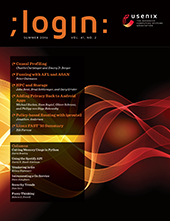
/dev/random
;login: Enters a New Phase of Its Evolution
For over 20 years, ;login: has been a print magazine with a digital version; in the two decades previous, it was USENIX’s newsletter, UNIX News. Since its inception 45 years ago, it has served as a medium through which the USENIX community learns about useful tools, research, and events from one another. Beginning in 2021, ;login: will no longer be the formally published print magazine as we’ve known it most recently, but rather reimagined as a digital publication with increased opportunities for interactivity among authors and readers.
Since USENIX became an open access publisher of papers in 2008, ;login: has remained our only content behind a membership paywall. In keeping with our commitment to open access, all ;login: content will be open to everyone when we make this change. However, only USENIX members at the sustainer level or higher, as well as student members, will have exclusive access to the interactivity options. Rik Farrow, the current editor of the magazine, will continue to provide leadership for the overall content offered in ;login:, which will be released via our website on a regular basis throughout the year.
As we plan to launch this new format, we are forming an editorial committee of volunteers from throughout the USENIX community to curate content, meaning that this will be a formally peer-reviewed publication. This new model will increase opportunities for the community to contribute to ;login: and engage with its content. In addition to written articles, we are open to other ideas of what you might want to experience.

The first time I heard the term “Fuzzy Logic” I thought it referred to the way cats plead with you to pet them and then park themselves just outside your reach. Rather than binary absolutes, fuzzy logic admits the existence of “degrees of truth” that acknowledge the ambiguous nature of nature. Life, in other words, is a multiple-multiple examination wherein the answer often turns out to be “all of the above.” One commonly cited example is when you toss a ball to someone. You don’t calculate exact values for all the variables constituting the trajectory; you just throw the dang thing in the general direction of your target and hope it doesn’t break Mrs. Anderson’s front window again. Fuzzy logic is a pandemic that has infected people and institutions worldwide and across historical epochs.
